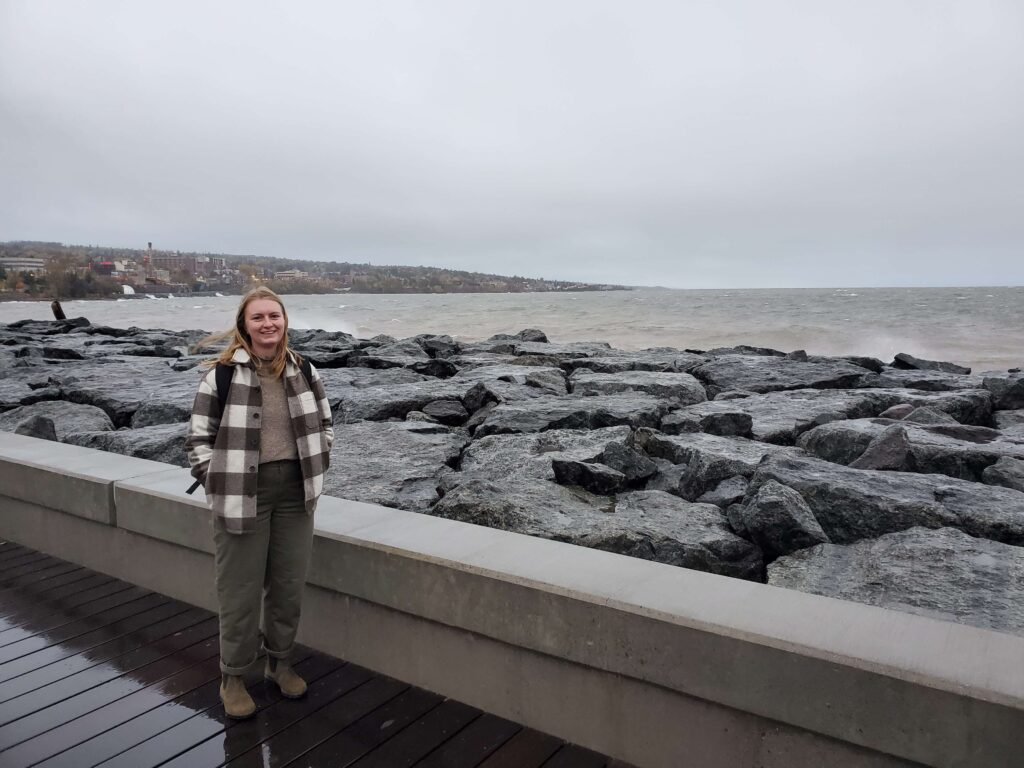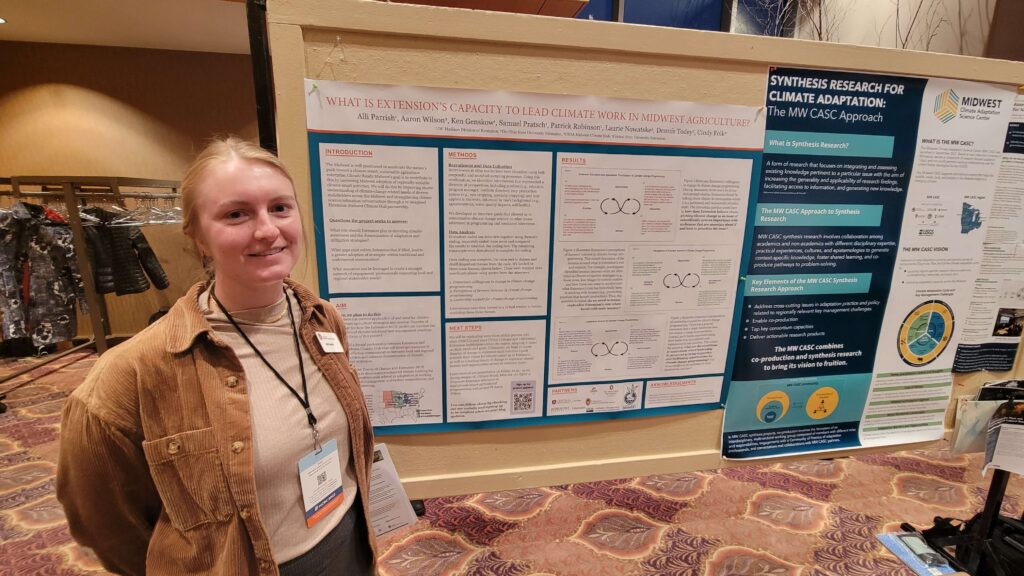Alli Parrish found purpose in working on climate resilience in the Midwest and shares how this work begins with establishing relationships between people and place.

I was one of those kids that was a “jack of all trades, master of none.” I never had an idea of what I wanted to be when I grew up or even what I wanted to study, because I enjoyed it all. That is, until about four years ago, when I realized I wanted to work on local climate action—helping connect communities with climate action.
Then, just over a year ago, I came into my dream job as Regional Climate Outreach Project Manager with UW–Madison Division of Extension, where I am today. In this role, I manage the Climate Ready Midwest project, with a team across the region working on climate change and agricultural programming at Extension.
Fast forward to a few weeks ago, when I attended the Midwest Climate Resilience Conference in Duluth, Minnesota. Climate resilience is about successfully preparing for and dealing with the impacts of climate change, while also considering how to prevent those impacts from getting worse. Some of the brightest minds working on climate in the Midwest were at this conference.
The conference gathered community leaders, Extension professionals, government agency staff, NGOs, and many others from across the region to facilitate meaningful dialogue, share experiences, and inspire collaboration and collective action to address climate change in the Midwest.
Climate work in the region is sometimes overlooked, yet midwestern agriculture, ecosystems, waterways, and cultural practices are already being impacted by rising temperatures, extreme precipitation, and drought. Many of us are already feeling this—but the conference highlighted the myriad work being done to address climate effects.
I took away some important lessons for my work as a climate professional and my connection with the community, and I want to share them with you:
The importance of building relationships with people
It can be a cliché, but it captures the depth of this particular breakout session. The conference connected me with a group of colleagues from across organizations and encouraged us to imagine our goals for the future of addressing climate change.
The conference generated questions about what we need to do in order to reach our goals. Our discussions led us to conclude that we need to act as highly connected, collaborative individuals, organizations, and communities. Yet we can’t achieve this without realizing that time spent building relationships is a critical priority.
Sometimes it feels like our professional norms superficially recognize the need for relationships but don’t always prioritize the time and space needed for the often-complicated process of actually cultivating relationships.
As professionals, we need to maintain these relationships to keep up with others’ work to enhance our collaboration and determine what pivots to make in our own work. We also need to uplift the two-way flow of information between organizations and communities, something Extension has long practiced.
For example, Extension’s Natural Resources Institute’s (NRI) Maple Syrup Program diligently maintains this relationship between university professionals and maple syrup producers. Producers can have concerns about their production, especially with environmental changes from climate change. NRI raises these issues to researchers and professionals in the field, who provide knowledge and support that addresses the concerns of those producers. This kind of responsive collaboration requires relationships as a baseline for success.
The importance of building relationships with the land
A land ethic is a moral code of conduct that drives how all members of a community treat one another for the mutual benefit of all. Perhaps the most famous land ethic is Aldo Leopold’s, from his essay in A Sand County Almanac. Leopold’s land ethic outlines the value he placed on the intertwined relationships between people and land, the fact that care for people cannot be separated from care for the land. A similar belief system has been long held by our Indigenous neighbors.
This idea of the land ethic helps describe an important theme from the conference that was especially poignant: Addressing the climate crisis is not about keeping society the same while simply transitioning to renewable energy—it is about bringing people into relationship with the land in many different ways, sometimes challenging current societal norms.
Exercising the land ethic, we challenge more basic climate solutions, like electric cars, and instead consider how to build safe communities and transportation systems that allow us to transition to other modes of transportation, like walking or biking. In this way, climate solutions offer reduced emissions and build communities that are more connected to nature.
At home, this may involve participating in a local environmental organization or becoming a citizen scientist and a WAV stream monitoring volunteer as a way to cultivate connection and care with the environment around you.
Practicing a land ethic and being involved in the environment will look different for everyone.
I think the idea of a land ethic is especially powerful for how we investigate climate solutions and involve our communities. We have a big challenge ahead of us, but it’s also an opportunity.
The opportunity we have is to ask ourselves: Are we going to keep doing more of the same? Or are we going to incorporate the land ethic? And how do we as individuals—and for me, as an individual working on a climate and agriculture project—contribute to this different way of doing things?

For me, these takeaways from the conference reinforced that the work we’re doing at Climate Ready Midwest is valuable. Sometimes, I feel removed from the farmers in this project because I oversee the educators who work with them, and I don’t always see the direct impacts of my work.
But it’s helpful for me to remember that I am part of a larger system of relationships working toward this goal. At the same time, none of this would be possible without the expressed interest of the communities we work with.
So, if climate change is a topic of interest to you, I encourage you to consider your relationship with the land and seek resources that support climate resilience!
If you are interested in climate action, you’re in the right place—Extension’s Natural Resources Institute has many diverse opportunities for both of those things and can connect your specific interests with education and action opportunities.
Learn about how climate change is impacting Wisconsin with Wisconsin Initiatives on Climate Change Impacts. Or, the next time you attend an NRI event, ask the educator or specialist how they see climate change impacting the work they are doing! And then ask: What can I do to help?




